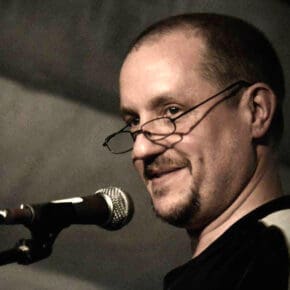Lizzie Strasser – Hi Chris, thanks for coming along! To start with, what are the most common misconceptions people have about short fiction?
Chris Fielden – Glad to be here! I think that it’s easy to do, or easier than writing a novel.
From a time perspective that’s probably true, but it’s an art in itself. Unless you’ve written extensively and practised that art, it’s a difficult market to break into successfully.
There are a number of really good interviews available online. One I’ve watched is with Stephen King, as he started off as a short story writer and then developed into novels.
There’s another with Roald Dahl which is useful, as a lot of people like to write — or try to write — children’s short stories, and that market is possibly the hardest one to break into.
He talks about why it’s so difficult, and his experience with it, as obviously he was very successful in that area.
It’s worth hopping on YouTube and having a look at those, and you can also find examples on the writing advice section of my website.
LS – Is it important to be aware of genres in short fiction, and do you need to take a different approach to different genres?
CF – That’s quite subjective, and it depends on who you’re writing for. One mistake that writers tend to make is not doing any market research before submitting to competitions or magazines.
Say you want to write sci-fi, for example. You still need to look at the market you’re intending to submit to.
You need to look at what they want, read back issues, read their submission guidelines, and take your time to research the market properly.
In my opinion, the genre isn’t that important. The core of how you write a good short story is the same no matter what genre you’re writing in: the story is the most important thing.
Say it’s horror. Horror should complement a really good story, and have its place in it. The same with humour, sci-fi, romance, all of it. You need strong characters and story. I think that’s the same for any genre, really.
If you write fiction, it allows you to explore and practice describing scenes, places and hooking the reader with description.
– Chris Fielden
LS – How can learning short fiction help if you’re writing factually, specifically travel or nature writing?
CF – If you write fiction, it allows you to explore and practice describing scenes and places, and hooking the reader with description.
If you wanted to do, say, travel writing, you need to give the reader a sense of place, what you’re writing about, where it is, the culture, what they might enjoy there.
If you’re used to writing fiction it can help with that kind of descriptive technique. When you think of something that isn’t real, you have to find ways of conveying it to the reader so they can picture it.
That translates well into conveying real things that people can’t directly experience.
LS – Last but not least, can you give us an example of some great short stories or writers anyone interested in short fiction should read?
CF – There are so many to choose from, I don’t think I can limit it to one! The funniest short story I’ve ever read, I think, is called Zombies on a Boat, by Mel Ciavucco, who is in my writing group.
That story is very clever in the way it’s structured. Although it pushes the boundaries of taste and isn’t going to be for everyone as some of the language in it is shocking, it’s done on purpose as a parody of things like Twilight, and the bad zombie films you’ve seen.
It’s badly written, on purpose. I think that could be the funniest story I’ve read.
If you want to learn about the craft, I think Roald Dahl. Tales of the Unexpected and things like that are brilliant, and you can learn a lot from him.
Robert E. Howard is very good. He wrote Conan, most famously, and if you read the Conan Chronicles, in two books, the descriptive language in that is fantastic.
The character, Conan, is quite over the top, really, but the way he’s portrayed and the language he uses really absorbs you into the story.
That’s a really good one to read.
Philip K. Dick is another one. If you like sci-fi you’ll like it, but if you look at the number of films that have been made out of his short stories, that stands testament to his imagination and the way he puts them forward.
Minority Report, Blade Runner, and many more are based on stories he’s written, so he’s an incredibly inventive short story writer.
They’re a few to start you off with, but there are so many!
LS – Thank you, those are some fantastic examples, and thanks very much, Chris. You’ve given us plenty to think about!
CF – You’re welcome, thank you for having me!
You can also watch the video of Chris’ interview.























